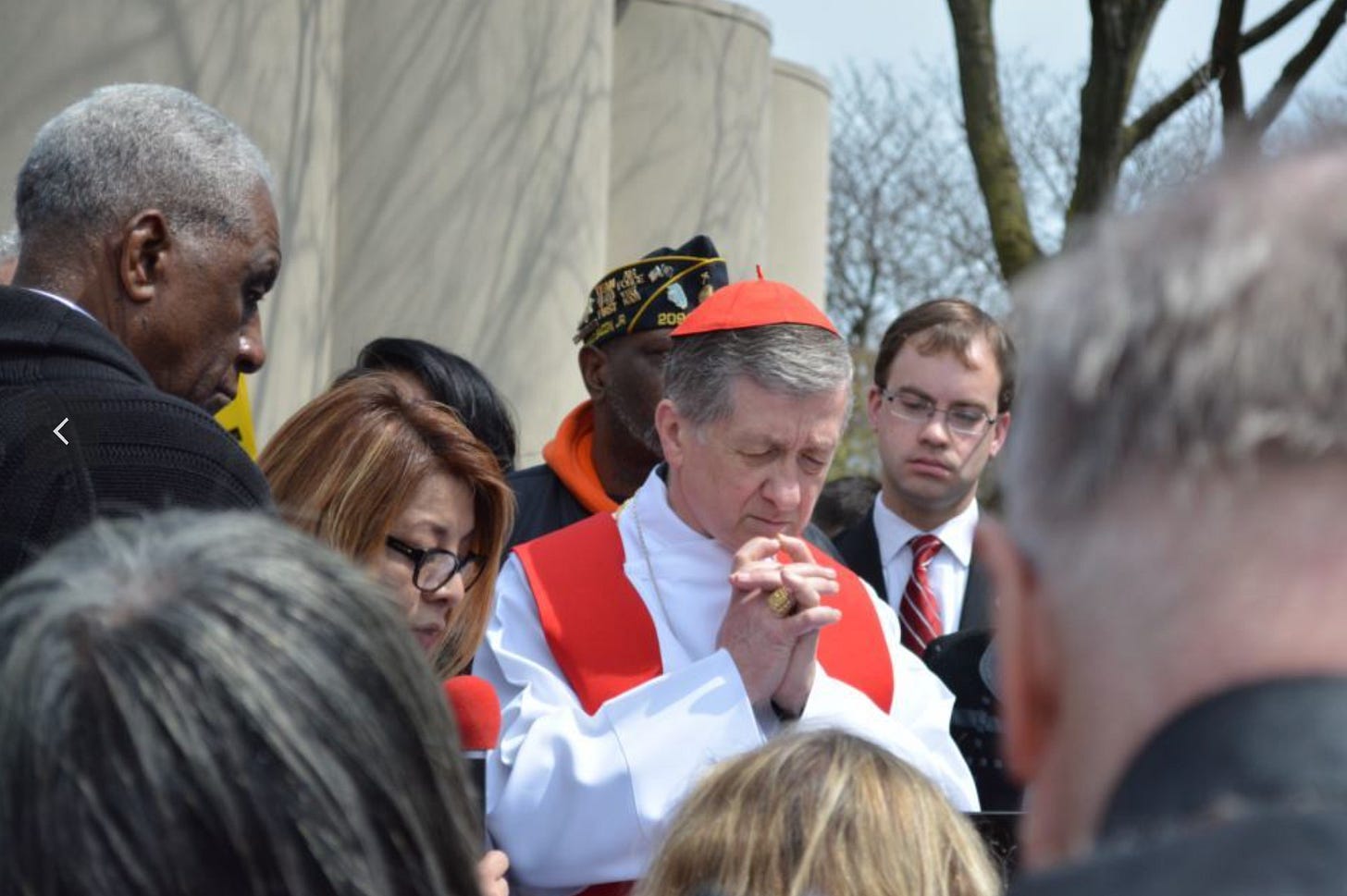Illinois Senator Dick Durbin declined on Tuesday a lifetime achievement award he was scheduled to receive from the Archdiocese of Chicago’s office of human dignity and solidarity.

Chicago Cardinal Blase Cupich issued an announcement on the subject at the same time senior leaders at the U.S. bishops’ conference were confidentially preparing to release a statement on the Durbin award, and had already informed the Vatican’s U.S. representative of their plans, according to several sources close to the process.
—
“Senator Durbin today informed me that he has decided not to receive an award at our Keep Hope Alive celebration,” Cardinal Cupich wrote in a Sept. 30 announcement of the senator’s decision.
“While I am saddened by this news, I respect his decision. But I want to make clear that the decision to present him an award was specifically in recognition of his singular contribution to immigration reform and his unwavering support of immigrants, which is so needed in our day.”
The announcement came after more than a week of controversy over the Archdiocese of Chicago’s decision to give Durbin an award at a November reception, aimed at recognizing his advocacy for immigrants in the United States.
After news of the award emerged earlier this month, Bishop Thomas Paprocki of Springfield, Illinois, expressed “shock” over the decision, saying in a statement that a Catholic recognition of Durbin would cause “grave scandal,” because of the senator’s “long and consistent record of supporting legal abortion — including opposing legislation to protect children who survive failed abortions.”
Paprocki explained that he intervened on the award because Durbin resides in the Springfield diocese, where he has been for years prohibited from receiving the Eucharist because of his advocacy for legal protection for abortion.
Paprocki also voiced concern that the decision to honor Durbin ran contrary to a June 2004 statement from the U.S. Conference of Catholic Bishops, and to Chicago’s own archdiocesan policy, which prohibits “awards or honors” to “individuals or organizations whose public position is in opposition to the fundamental moral principles of the Catholic Church.”
Cupich defended the decision, saying in a Sept. 22 statement that his decision to confer an award on Durbin was in line with Vatican guidance on the need for dialogue with politicians who oppose Church teaching on abortion.
“I have remained faithful to the May 2021 instructions of the then-Congregation for the Doctrine of Faith, advising bishops to ‘reach out to and engage in dialogue with Catholic politicians within their jurisdictions…as a means of understanding the nature of their positions and their comprehension of Catholic teaching,’” Cupich wrote.
But while Cupich did not give any indication that he would reconsider the plan, U.S. bishops’ conference leaders, including USCCB president Archbishop Timothy Broglio, were inundated in recent days with private messages from bishops, several sources close to the conference told The Pillar.
Most of those messages, sources said, urged that the conference itself make a statement, reemphasizing its 2004 guidance that “Catholic institutions should not honor those who act in defiance of our fundamental moral principles. They should not be given awards, honors or platforms which would suggest support for their actions.”
Conference spokesperson Chieko Noguchi declined to comment Tuesday afternoon, but several senior U.S. sources told The Pillar that some conference leaders were confidentially preparing a statement on the subject, which they expected to issue in coming days, presumably from the president’s office, or from the conference’s administrative committee.
And Vatican and senior U.S. sources told The Pillar that conference leaders had notified the apostolic nunciature in Washington that a statement related to the Durbin award was expected to be issued by the bishops’ conference.
—
It is not clear what prompted Durbin’s withdrawal or Cupich’s Tuesday afternoon announcement. Some bishops suggested to The Pillar Tuesday that a pending USCCB statement catalyzed the move, with Cupich not eager to be seen as opposed by the body of U.S. bishops, or that the U.S. apostolic nuncio urged Cupich to shut down the award before public division among the bishops intensified.
Others have noted that the cardinal’s announcement came just hours after Pope Leo himself weighed in on the award, answering questions about the issue Tuesday evening, as he departed his country residence at Castel Gandolfo.
“I am not terribly familiar with the particular case. I think it’s important to look at the overall work that a senator has done during, if I’m not mistaken, in 40 years of service in the United States Senate,” the pope told reporters, after a question on the subject from EWTN News.
“I understand the difficulty and the tensions. But I think as I myself have spoken in the past, it’s important to look at many issues that are related to the teachings of the Church.”
“Someone who says I’m against abortion but is in favor of the death penalty is not really pro-life,” the pope said. “Someone who says I’m against abortion but I’m in agreement with the inhuman treatment of immigrants in the United States, I don’t know if that’s pro life.”
“So they are very complex issues and I don’t know if anyone has all the truth on them, but I would ask first and foremost that they would have respect for one another and that we search together both as human beings and in that case as American citizens and citizens of the state of Illinois, as well as Catholics, to say that we need to be close to all of these ethical issues. And to find the way forward as a Church,” Pope Leo said. “The Church teaching on each one of those issues is very clear.”
Leo’s remarks did not directly take a side on the issue.
But for his part, Cupich wrote Tuesday that he had hoped the Durbin award would be a moment for deeper consideration of Catholic doctrine.
“My hope was that our Keep Hope Alive celebration would serve as an invitation to Catholics who fiercely defend the vulnerable on the border between the United States and Mexico to ponder why the Church defends the vulnerable on the border between life and death, as in cases of abortion and euthanasia. Likewise, it could be an invitation to Catholics who tirelessly promote the dignity of the unborn, the elderly, and the sick to extend the circle of protection to immigrants facing in this present moment an existential threat to their lives and the lives of their families.”
Lamenting polarization, the cardinal wrote in the course of his priestly ministry, he has “seen the divisions within the Catholic community dangerously deepen.”
“The tragedy of our current situation in the United States is that Catholics find themselves politically homeless. The policies of neither political party perfectly encapsulate the breadth of Catholic teaching,” the cardinal wrote, while “Catholics themselves remain divided along partisan lines, much like all Americans. This impasse has become more entrenched over the years and our divisions undermine our calling to witness to the Gospel.”
Recognizing that “there are essentially no Catholic public officials who consistently pursue the essential elements of Catholic social teaching because our party system will not permit them to do so,” Cupich explained that in his view, “total condemnation is not the way forward, for it shuts down discussion.”
“More broadly, a positive approach can keep alive the hope that it is worth talking to one another — and collaborating with one another — to promote the common good. No one wants to engage with someone who treats them as a thoroughgoing moral threat to the community. But people will engage with, and may even learn from, those who recognize them as making some contribution to a common endeavor.”
The cardinal said that Catholics need to both talk and listen to each respectfully in order to overcome political divide, and that the Durbin affair could be understood as a call for more synodality in the Church.
“This way of being church, of being human, one might even call synodal. And it is this path, beautifully laid out for us by our late beloved Holy Father, Pope Francis, which can lead all Catholics to embrace the fullness of our teachings. Such witness would undoubtedly serve society by building up the common good.”
“I believe it would be worthwhile to schedule some synodal gatherings for members of the faithful to experience listening to each other with respect on these issues, all the while remaining open to maturing more fully in their common identity as Catholics. Perhaps our Catholic universities can be of assistance. As I give thought to how such gatherings might take place, I welcome suggestions,” the cardinal said.
Cupich’s call for more conversation about the common good comes just days ahead of the five-year anniversary of Pope Francis’ encyclical Fratelli tutti, which addressed themes of social friendship and the Catholic conception of the common good.
The U.S. bishops’ conference is expected to issue a statement on that anniversary this week, with a similar emphasis on the importance of promoting the common good and decreasing polarization among Catholics.
Source link

